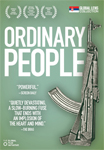| |
|
 
|
ORDINARY PEOPLE (Obicni ljudi) |
 |
 |
| Featuring: Relja Popovic, Boris Isakovic, Miroslav Stevanovic, Vladimir Devic, Dejan Spasojevic |
| Director: Vladimir Perisic |
|
Studio: Global Film Initiative |
| DVD release: 27 September 2011 |
|
Runtime: 79 minutes (1 disc) |
| Format: NTSC, Widescreen |
| DVD Features: Aspect ratio 1.83:1, Audio tracks (Dolby Digital 2.0 Stereo - Serbian), Subtitles (English), Discussion guide w/ director's biography and film notes, Global Lens Film Series trailers |
** REVIEW CONTAINS SPOILERS ** |
 Serbian writer and director Vladimir Perisic mines the quiet spaces of a civil war to unearth horrors perhaps more devastating than those found in the chaos of pitched battle. The bucolic Balkan countryside provides an ironic backdrop for the tragic transformation of a callow young soldier over the course of a single day from innocence to culpability and acquiescence. Serbian writer and director Vladimir Perisic mines the quiet spaces of a civil war to unearth horrors perhaps more devastating than those found in the chaos of pitched battle. The bucolic Balkan countryside provides an ironic backdrop for the tragic transformation of a callow young soldier over the course of a single day from innocence to culpability and acquiescence.
 Fresh out of basic training and not long out of high school, Dzoni (Relja Popovic) is awakened to another day in his first posting. He has been here for only weeks, but the routine is set - the reveille of an officer's heavy-booted footfalls and brusque shouts to get up, his bunkmates rousing him from heavy sleep, making the cots and standing for review, shit-shower-and-shave in the communal bathrooms, uniforms on, wolfing down nondescript breakfast in the mess hall. His unit is called to move out, and they grab their rifles on their way out the door. Fresh out of basic training and not long out of high school, Dzoni (Relja Popovic) is awakened to another day in his first posting. He has been here for only weeks, but the routine is set - the reveille of an officer's heavy-booted footfalls and brusque shouts to get up, his bunkmates rousing him from heavy sleep, making the cots and standing for review, shit-shower-and-shave in the communal bathrooms, uniforms on, wolfing down nondescript breakfast in the mess hall. His unit is called to move out, and they grab their rifles on their way out the door.
 A long, somnolent bus ride (interrupted only by a horse standing blithely in the road; it is easily chased out of the way) terminates at an abandoned farm. The members of the unit disperse to seek respite from the day's rising heat while they await their orders. A long, somnolent bus ride (interrupted only by a horse standing blithely in the road; it is easily chased out of the way) terminates at an abandoned farm. The members of the unit disperse to seek respite from the day's rising heat while they await their orders.
 When a smaller bus filled with prisoners in civilian clothes arrives, the soldiers' task is made plain: execution. Dzoni balks initially, but after a minute moves to catch up with the others. He looks away when he fires, and his shot does not immediately killed the man assigned randomly as his target. Another soldier walks in and stills the twitching body with a round at close range. When a smaller bus filled with prisoners in civilian clothes arrives, the soldiers' task is made plain: execution. Dzoni balks initially, but after a minute moves to catch up with the others. He looks away when he fires, and his shot does not immediately killed the man assigned randomly as his target. Another soldier walks in and stills the twitching body with a round at close range.
 More waiting. Another bus. Another walk down the path to the same swath of tall grass. This time Dzoni's aim is true. More waiting. Another bus. Another walk down the path to the same swath of tall grass. This time Dzoni's aim is true.
The process repeats itself as the day wears on. The officer has bottles of liquor delivered to keep his men occupied. One prisoner mutely refuses to turn away from his executioners, and Dzoni snaps. He roughly pushes the man down, but he keeps turning to rise again. Dzoni shoves him down again then strikes him with the butt of his rifle - and again, and again, and again, until there is no more need. He is helpless to blame his superiors for where he finds himself, he is helpless to escape the situation. His self-loathing turns outward against his victims.
At last there are no more buses, and the sweaty, weary soldiers reboard for their return trip. Most of the dialogue has been spoken either by a faceless radio announcer or by the CO, but we know that the Dzoni reflected in the bus window is not the same boy as the one whose face looked back at him in the morning. The CO knows this is difficult for the soldiers he directs. When a friend radios him looking for some of his men who have gone missing in the area, the CO tells him that he won't find them. Some do refuse, and disappear.
The banality is part and parcel with the crushing sense of atrocity. There are no screams, no explosions, no heroically principled stands against evil, no dramatic breaks to escape. The monotone radio propaganda about "enemy terrorists" hidden among civilians and their supposed war crimes is bookeneded by sports reports and weather forecasts. Between each bus delivering another handful of silent men, the soldiers smoke or try to nap in the shade, cut the heat with splashes of water from an outdoor spigot, examine the blisters on their hands from the trigger holds, ease the boredom (and drown their unspoken guilt) with a bottle passed summarily from one to the next after a single practical swig.
Therein lies the power and tragedy of Ordinary People : the victims are ordinary, the fingers pulling the triggers are ordinary. Only unseen voices in unseen halls of power determine which of these ordinary people will be forced to kneel and bare their necks, and which of them will squeeze off the final shot. In the end, though every man is stained with his own deeds. : the victims are ordinary, the fingers pulling the triggers are ordinary. Only unseen voices in unseen halls of power determine which of these ordinary people will be forced to kneel and bare their necks, and which of them will squeeze off the final shot. In the end, though every man is stained with his own deeds.
|
|
|

 Serbian writer and director Vladimir Perisic mines the quiet spaces of a civil war to unearth horrors perhaps more devastating than those found in the chaos of pitched battle. The bucolic Balkan countryside provides an ironic backdrop for the tragic transformation of a callow young soldier over the course of a single day from innocence to culpability and acquiescence.
Serbian writer and director Vladimir Perisic mines the quiet spaces of a civil war to unearth horrors perhaps more devastating than those found in the chaos of pitched battle. The bucolic Balkan countryside provides an ironic backdrop for the tragic transformation of a callow young soldier over the course of a single day from innocence to culpability and acquiescence.  Fresh out of basic training and not long out of high school, Dzoni (Relja Popovic) is awakened to another day in his first posting. He has been here for only weeks, but the routine is set - the reveille of an officer's heavy-booted footfalls and brusque shouts to get up, his bunkmates rousing him from heavy sleep, making the cots and standing for review, shit-shower-and-shave in the communal bathrooms, uniforms on, wolfing down nondescript breakfast in the mess hall. His unit is called to move out, and they grab their rifles on their way out the door.
Fresh out of basic training and not long out of high school, Dzoni (Relja Popovic) is awakened to another day in his first posting. He has been here for only weeks, but the routine is set - the reveille of an officer's heavy-booted footfalls and brusque shouts to get up, his bunkmates rousing him from heavy sleep, making the cots and standing for review, shit-shower-and-shave in the communal bathrooms, uniforms on, wolfing down nondescript breakfast in the mess hall. His unit is called to move out, and they grab their rifles on their way out the door. A long, somnolent bus ride (interrupted only by a horse standing blithely in the road; it is easily chased out of the way) terminates at an abandoned farm. The members of the unit disperse to seek respite from the day's rising heat while they await their orders.
A long, somnolent bus ride (interrupted only by a horse standing blithely in the road; it is easily chased out of the way) terminates at an abandoned farm. The members of the unit disperse to seek respite from the day's rising heat while they await their orders.  When a smaller bus filled with prisoners in civilian clothes arrives, the soldiers' task is made plain: execution. Dzoni balks initially, but after a minute moves to catch up with the others. He looks away when he fires, and his shot does not immediately killed the man assigned randomly as his target. Another soldier walks in and stills the twitching body with a round at close range.
When a smaller bus filled with prisoners in civilian clothes arrives, the soldiers' task is made plain: execution. Dzoni balks initially, but after a minute moves to catch up with the others. He looks away when he fires, and his shot does not immediately killed the man assigned randomly as his target. Another soldier walks in and stills the twitching body with a round at close range. More waiting. Another bus. Another walk down the path to the same swath of tall grass. This time Dzoni's aim is true.
More waiting. Another bus. Another walk down the path to the same swath of tall grass. This time Dzoni's aim is true.

